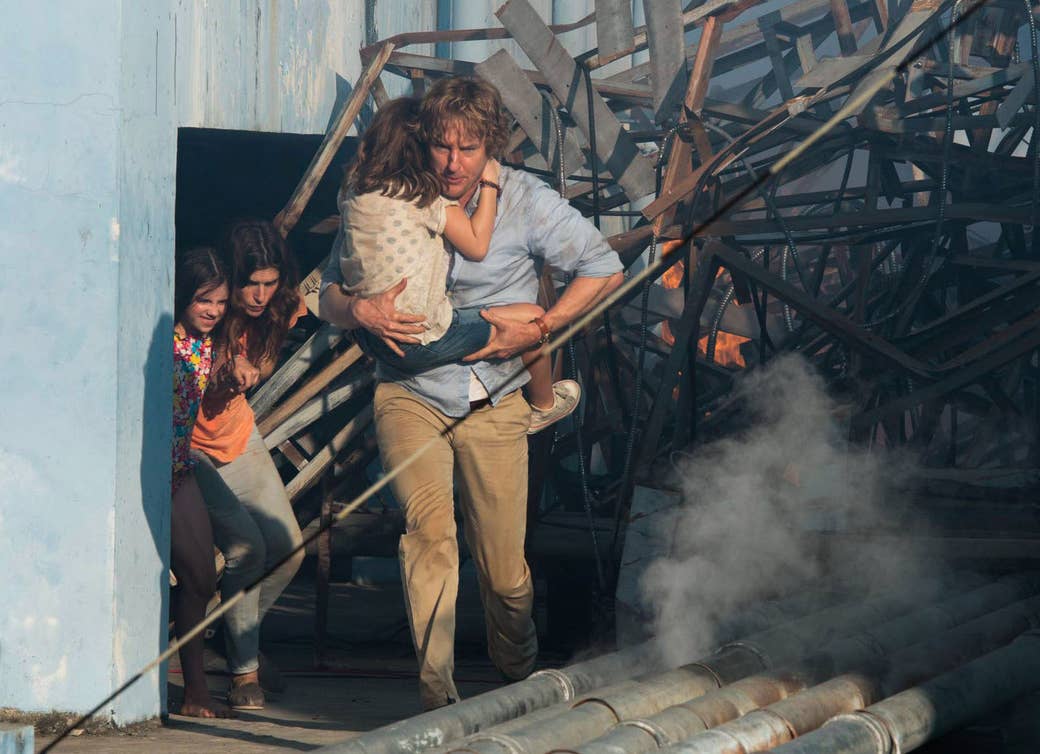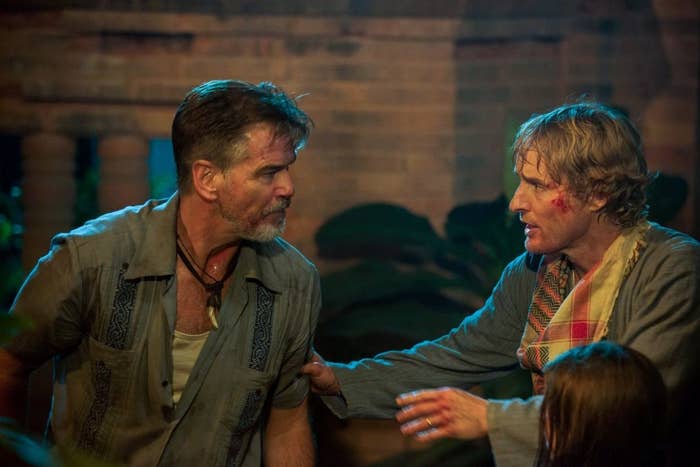
No Escape isn't a zombie movie, but sometimes it sure feels like one.
Take the early sequence right after everything's gone to hell. A panicked family — mom, dad, and their two girls — are making their way through a building, trying to get to the roof, from which they hope they'll be rescued. Lurking around every corner are dangerous hordes who charge at and try to kill our heroes whenever they're in sight. It's a scene right out of World War Z, except instead of Brad Pitt and Mireille Enos, there's Owen Wilson and Lake Bell getting their serious movie on; instead of a Newark housing project, the setting's a Southeast Asian hotel; and in the place of the infected, there are Asian guerrillas, just as faceless and just as menacing, wielding machetes and guns instead of an undead appetite.
No Escape director John Erick Dowdle and his brother and co-writer Drew Dowdle made scary fare like The Poughkeepsie Tapes, Quarantine, and As Above, So Below, which explains why their Americans-abroad thriller is staged, sometimes to great effect, like survival horror. But it doesn't explain why so many people OK'd a movie that uses an entire foreign population like monsters lurking in the dark. Its backdrop of an unspecified Southeast Asian country is all swindling cabbies and broken-down hotels before a coup erupts and foreigners are dragged into the street to be shot. Why this is happening and what the rebels want is unimportant — no one cares about a zombie's motives either.

There's no separation in No Escape between the xenophobia of its characters — a family trying to smile through an unwanted move from Austin to Darkest Asia because of dad's new job — and the xenophobia of the movie itself, which confirms they are right to be afraid and upset. It's about the violent, bloody overthrow of a government, and yet, beyond a quick shrug of an explanation that these things are mostly the West's fault, the movie is interested in the turmoil only as it imperils the lives of its American main characters.
While shot in Thailand, where there was a real coup just last year, No Escape contorts itself to avoid having to name the country in which it takes place. "Welcome to Asia," a seedy, enigmatic expat played by Pierce Brosnan says, not unlike our common American greeting of "Welcome to North America!" Things are made more unplaceable by the use of upside-down Khmer script onscreen (which reportedly got the film banned in Cambodia) and a bit about making a run for Vietnam, which doesn't share a border with Thailand.
It doesn't ultimately matter — the story has nothing to do with an actual place in Asia and everything to do with affirming a outsider view of the region as a hotbed of corruption and sex work, filled with people looking to either rip foreigners off or, given the opportunity, kill them. Of the many Asian characters who pass by onscreen (and, frequently, die onscreen, sometimes because some American family has chosen to hide near them), the only one who's individualized enough to get a name is "Kenny Rogers" (Sahajak Boonthanakit), who goes by the moniker of his favorite musician for the sake of anyone who can't pronounce his actual one.
Bell and Wilson make for surprisingly solid parental action leads as Annie and Jack Dwyer, bracing themselves against doors and climbing down buildings in their sensible tourist khakis and Toms, spending most of the No Escape's runtime on the run.
But the B-movie kicks of scenes like the one in which Jack, with the assistance of some speed ramping, hurls his children across rooftops into his wife's arms as part of an escape plan, never overcome the rankness of the underlying premise. The Dwyers' children, Lucy (Sterling Jerins) and Beeze (Claire Geare), verge on intolerable, going from complaining about the hotel before it's invaded to complaining about needing to pee as the family hides behind rubble and a dead body. But the flicker of a joke that travel with family can be tiresome even without people trying to kill you is one of the only touches of self-awareness No Escape shows.Otherwise, the Dwyers' willingness to do whatever's necessary to protect their offspring is tied, for a second, to a half-formed explanation about how the rebels are acting to protect their own kids, an offering of empathy that lasts as long as it takes for Wilson to smash someone's head in. No Escape is as indifferent to the humanity of the anonymous Southeast Asians it uses for fodder as its protagonist apparently was when he took a gig at a predatory international corporation. Jack, a failed businessman in search of a fresh start, may be an image of tarnished white American masculinity in need of the redemption that comes from protecting his family with his bare hands, but he can rest assured that he's still the guy Hollywood wants to make movies about.
